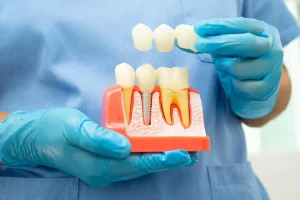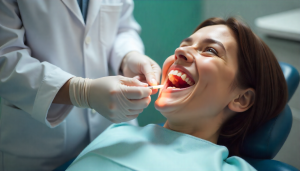Our doctors at Doral Sedation & Family Dentistry will gladly help with all questions and queries regarding dental health. One of the concerns patients often raise is that their gums bleed when flossing.
Our doctors at Doral Sedation & Family Dentistry will gladly help with all questions and queries regarding dental health. One of the concerns patients often raise is that their gums bleed when flossing. It might not sound as troubling as tooth decay, but the condition of our gums is vital in keeping your oral hygiene on a high level and the health of your teeth. Here’s what to do if you experience the same problem.
Importance of flossing
Flossing is as important and brushing. If you want to clean your mouth thoroughly, there’s no better way than the floss. Regardless of how long and hard we press that brush against the teeth, it’s impossible to reach all of the accumulated food deposits. Whatever remains there is causing trouble to booth gum and teeth, and it’s vital to get it out. Interdental brushes and floss are the main tools in this process.
If you started flossing recently
If flossing is new to you and there are traces of blood or your gums hurt after flossing, in most cases, it’s just a temporary manifestation. This can happen due to gum inflammation, a condition that can lead to full-blown gum disease if it isn’t treated. What to do in this scenario? Take it easy and do not tighten the floss, gentle moves will get the accumulated food out of there without hurting the gums. It can take up to 15 days but the bleeding typically stops after this.
If you floss regularly
Experiencing bleeding gums while flossing regularly does not mean you should stop with the routine. If anything, bleeding is the indicator that the cleaning (brushing and flossing) was not as thorough. In case that your gums are swollen, painful and bleed, you should at least temporarily be slightly gentler. Ultimately, you wouldn’t want to kick the habit that helps the gum tissue get better!
Gum disease
Gum inflammation, sore and aching gums are not the first conditions when we think of the dentist, but our soft tissue found in the mouth hurts just the same as our teeth. Leftover bacteria are responsible not only for plaque and cavities but also inflame our gums and can cause a cascade of problems.
There are two types of gum disease:
Gingivitis is the less severe type of the two, manifesting in nearly 70% of adults in the U.S. above the age of 35.
Periodontitis is a more progressive form: it damages gums and can devastate the bones supporting teeth as well. Ultimately, it can lead to teeth loss.
With certain patients, symptoms are mild, which is why they often fail to notice these changes at first. Making sure you clean your teeth is thus just one part of the process, pay attention to the gums and their condition and floss them at least once a day. Unlike teeth, gums can recover with improved oral hygiene.
How to floss properly?
As with every part of human hygiene, there are good and bad approaches to flossing as well. There is no difference in where you start, upper or lower teeth and the direction in which you move – it’s important how you perform the flossing. So if you want to improve your oral hygiene and stop bleeding gums, here are the steps:
Break off around 18 inches of floss and wind the ends around your middle fingers.
Hold the floss with your forefinger and thumb – leave two inches for the cleaning.
Gently lead the floss between your teeth.
Press against the teeth and do not pressure the gums, move away from the gum-line towards the end of the tooth.
Move the floss around your teeth and clean them all thoroughly including wisdom teeth.
Keep in mind that you should constantly feed the clean floss with one hand and avoid taking more gum tissue away by aggressively pulling close to gums.
If you have more questions about how to stop bleeding gums reach out to us at Doral Sedation & Family Dentistry. We will determine the root cause and ease your gum troubles. Please schedule a consultation online or contact our office today.








